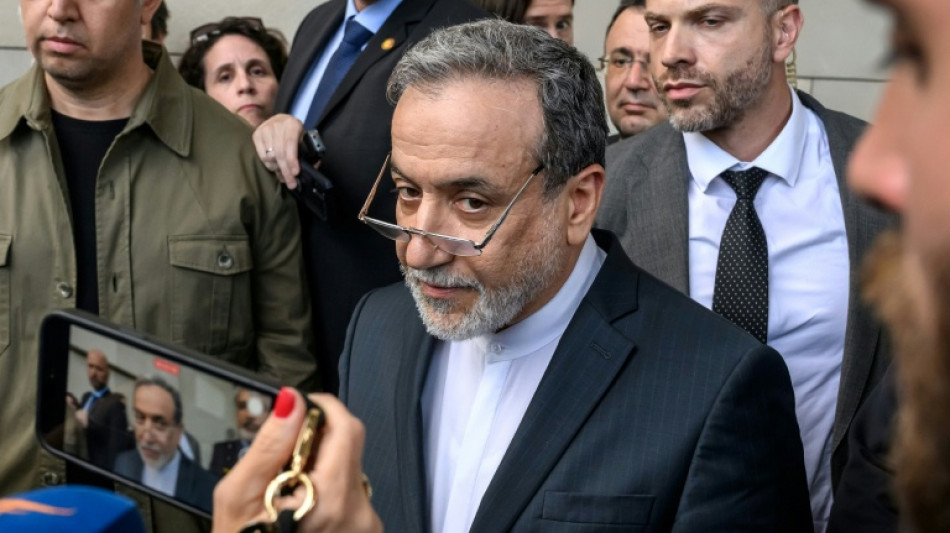
Iran rejects nuclear talks with US before Israeli 'aggression' stops

Iran said Friday it would not resume nuclear negotiations with the United States until Israel halts its attacks, as Israel's military chief warned the week-old war will be "prolonged".
A series of blasts were heard in Tehran on Friday as Iran's Fars news agency said air defences had been activated, as Israel kept up its bombardment and Iran launched missiles at its arch enemy.
"We must be ready for a prolonged campaign," Israeli military chief Eyal Zamir told Israelis in a video statement, eight days after his country launched a massive wave of strikes it said were aimed at stopping Iran from developing nuclear weapons -- an ambition Tehran has denied.
"The campaign is not over. Although we have made significant achievements, difficult days still lie ahead," he said.
As US President Donald Trump mulls the prospect of entering the war between the two foes, top diplomats from Britain, France and Germany met with their Iranian counterpart Abbas Araghchi in Geneva.
Referring to nuclear negotiations with Washington that had been derailed by the war, Araghchi said after the meeting that "Iran is ready to consider diplomacy once again and once the aggression is stopped".
Tehran did "support the continuation of discussion with" the European countries and was willing "to meet again in the near future", Araghchi told reporters.
French Foreign Minister Jean-Noel Barrot said "we invited the Iranian minister to consider negotiations with all sides, including the United States, without awaiting the cessation of strikes, which we also hope for".
Barrot said there "can be no definitive solution through military means to the Iran nuclear problem" and warned that it was "dangerous to want to impose a regime change" in Iran, after Israeli Prime Minister Benjamin Netanyahu did not rule out killing supreme leader Ayatollah Ali Khamenei.
On the streets of Tehran, many shops were closed and normally busting markets largely abandoned on Friday, an AFP journalist reported.
"I'm not afraid of the war, I stay open but business is really bad," said a vendor at the Tajrish market who declined to give his name for security reasons.
Nearby, police set up a checkpoint while workers repaired a road damaged in a recent Israeli strike.
- 450 missiles -
Since Israel launched its offensive on June 13, targeting nuclear and military sites but also hitting residential areas, Iran has responded with barrages which Israeli authorities say have killed at least 25 people.
A hospital in the Israeli port of Haifa reported 19 injured, including one person in serious condition, after the latest Iranian salvo.
Iran said on Sunday that Israeli strikes had killed at least 224 people, including military commanders, nuclear scientists and civilians. It has not updated the toll since.
A US-based NGO, the Human Rights Activists News Agency, provided a toll on Friday based on sources and media reports, saying at least 657 people have been killed in Iran, including 263 civilians.
Israel's military said it struck missile launchers in southwestern Iran after overnight air raids on dozens of targets including a nuclear research centre.
In Israel, sirens sounded in the afternoon after missiles were launched from Iran for the second time on Friday. Iran's Revolutionary Guards said they had targeted military sites and air force bases.
Trump said on Thursday he will decide "within the next two weeks" whether to involve the United States in the fighting.
A US Navy official said Friday that an aircraft carrier will be moved closer to the Middle East next week, making it the third in or near the region.
- 'Madness' -
"This is a perilous moment, and it is hugely important that we don't see regional escalation of this conflict," said Britain's Foreign Secretary David Lammy, who earlier stated "Iran can never develop or acquire a nuclear weapon".
Western governments suspect Iran of seeking a nuclear weapons capability.
"So, saying how long it would take for them, it would be pure speculation because we do not know whether there was somebody... secretly pursuing these activities," the agency's chief Rafael Grossi told CNN.
"We haven't seen that and we have to say it."
In an interview with German publication Bild, Israel's top diplomat Gideon Saar said he did not "particularly" believe in diplomacy with Iran.
"All diplomatic efforts so far have failed," said Saar, whose country had supported Trump's 2018 decision to abandon a previous nuclear agreement between Iran and world powers.
Turkish President Recep Tayyip Erdogan warned the escalating confrontation is quickly reaching "the point of no return", saying "this madness must end as soon as possible".
UN chief Antonio Guterres meanwhile pleaded with all sides to "give peace a chance".
Any US involvement in Israel's campaign would be expected to involve the bombing of an underground uranium enrichment facility in Fordo, using powerful bunker-busting bombs that no other country possesses.
Switzerland announced it was temporarily closing its embassy in Tehran, adding that it would continue to fulfil its role representing US interests in Iran.
burs-ser/ami/kir
P.Jones--TNT